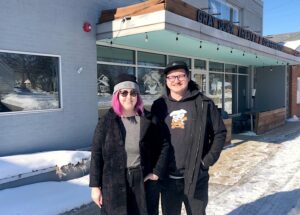When Rob Conboy set off for Germany in 2016, he was in search of technologies that would lower the cost of doing energy-efficient construction projects in the United States. What he found was a product that existed in Europe for decades but hadn’t yet taken off in the states: foam glass gravel.
Foam glass gravel looks like a piece of charcoal and has the texture of a sponge; think of it as a combination between lava rocks and pumice. It is lightweight and made from recycled glass powder. Foam glass gravel is used in commercial and residential construction projects, oftentimes as insulation for roofs, foundation walls, and underneath slabs.
Conboy realized that this product not only extends the life of recycled glass and keeps it out of landfills; it serves as a practical replacement for gravel and foam board in building projects, which drive demand for fossil fuels and leach petrochemicals into the soil.
Inspired by what he had seen, Conboy was determined to make this product more readily available in the United States. He returned to Burlington, VT and launched his own foam glass gravel company: Glavel, Inc.
Conboy eased Glavel into the marketplace, proving the concept first by selling foam glass gravel imported from Europe. Once the sales and demand were proven, the next step was to open his own plant and begin manufacturing the product.
But doing so would require a multimillion-dollar piece of equipment: a kiln.
After speaking with different lenders who were uninterested in providing financing, Conboy connected with CRF and received an SBA 7(a) loan to purchase the kiln.
“We had talked to different lenders here in Vermont, but they didn’t have the capacity or the risk appetite for us being a startup,” Conboy said. “But CRF did and believed in the broader vision of what we were trying to achieve: to be a force for positive change in the communities that we serve. The loan provided Glavel with crucial funding, but it wasn’t without difficulties. Ultimately the loan was transformative but did require great sacrifice.”
Most foam glass kilns are gas fired, but Conboy opted to electrify his as an effort to reduce the embodied carbon of an already environmentally friendly building material.
“As architects, engineers, and builders are considering the materials that they’re using – they can see what the embodied carbon is in our product, which helps them meet their carbon goals,” Conboy explained.
In addition to financing the purchase of the kiln, a portion of the CRF loan was used as working capital, which helped Conboy hire a production team. And decreasing the carbon impact of the construction industry isn’t Glavel’s only mission – the company also strives to create a diverse and welcoming workplace.
“We were one of the first companies in Vermont to sign the Equal Pay Compact and are committed to diversity, equity, and inclusion,” said Conboy.
Glavel’s staff includes a female plant manager, several new Americans, and several formerly incarcerated individuals. Glavel partners directly with an organization that helps those transitioning from prison to find employment.
“I always knew that if I was in the position to create my own company, that would be a top priority – to make sure that we did our part to help break that cycle of incarceration,” Conboy said.
As Conboy looks to the future of Glavel, he plans to make the plant fully functional and begin manufacturing glass powder on-site, which he anticipates will happen in the next year. And while he has come a long way since his trip to Germany in 2016, getting Glavel to its current position hasn’t been easy. It has required hard work and patience, and he is thankful to have found a lender that believed in his vision.
“Getting this loan was so much validation,” Conboy said. “Realizing how important our work is – that this is going to be transformative from a recycling standpoint, from a social justice standpoint, and to have an organization be so aligned with our values and our vision – to find that in CRF was just phenomenal.”


